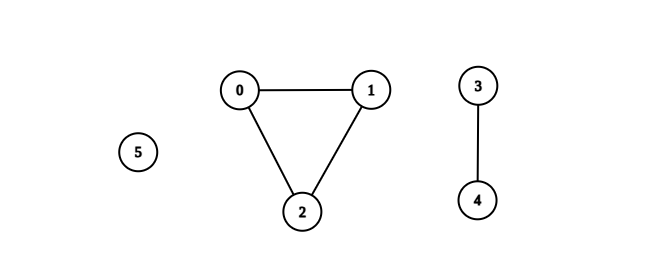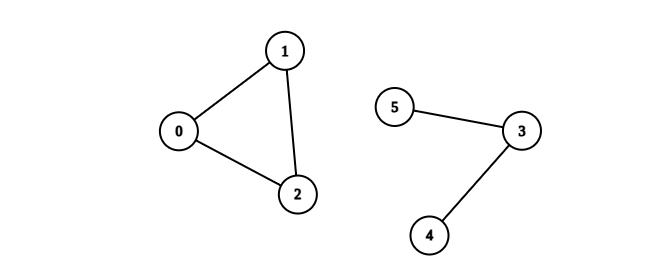LeetCode in Kotlin
2685. Count the Number of Complete Components
Medium
You are given an integer n. There is an undirected graph with n vertices, numbered from 0 to n - 1. You are given a 2D integer array edges where edges[i] = [ai, bi] denotes that there exists an undirected edge connecting vertices ai and bi.
Return the number of complete connected components of the graph.
A connected component is a subgraph of a graph in which there exists a path between any two vertices, and no vertex of the subgraph shares an edge with a vertex outside of the subgraph.
A connected component is said to be complete if there exists an edge between every pair of its vertices.
Example 1:

Input: n = 6, edges = [[0,1],[0,2],[1,2],[3,4]]
Output: 3
Explanation: From the picture above, one can see that all of the components of this graph are complete.
Example 2:

Input: n = 6, edges = [[0,1],[0,2],[1,2],[3,4],[3,5]]
Output: 1
Explanation: The component containing vertices 0, 1, and 2 is complete since there is an edge between every pair of two vertices. On the other hand, the component containing vertices 3, 4, and 5 is not complete since there is no edge between vertices 4 and 5. Thus, the number of complete components in this graph is 1.
Constraints:
1 <= n <= 500 <= edges.length <= n * (n - 1) / 2edges[i].length == 20 <= ai, bi <= n - 1ai != bi- There are no repeated edges.
Solution
@Suppress("NAME_SHADOWING")
class Solution {
fun countCompleteComponents(n: Int, edges: Array<IntArray>): Int {
val adj = HashMap<Int, ArrayList<Int>>().apply {
for ((u, v) in edges) {
this[u] = getOrDefault(u, arrayListOf()).apply { add(v) }
this[v] = getOrDefault(v, arrayListOf()).apply { add(u) }
}
}
val visited = BooleanArray(n)
fun bfs(i: Int): Pair<Int, Int> {
if (visited[i]) return 0 to 0
visited[i] = true
var nodes = 1
var edges = (adj[i]?.size ?: 0)
adj[i]?.forEach {
val (nodes2, edges2) = bfs(it)
nodes += nodes2
edges += edges2
}
return nodes to edges
}
var res = 0
for (i in 0 until n) {
if (!visited[i]) {
val (nodes, edges) = bfs(i)
if ((nodes * (nodes - 1)) == edges) {
res++
}
}
}
return res
}
}

